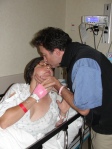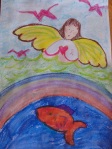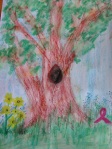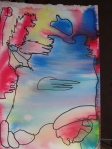With the constant  barrage of advertisements for holiday sales, we have lost the meaning of Christmas. This deeply saddens me. I will not shop at every given moment only because the media tells me to. Instead of buy, buy, buy, I want to dig a hole in the snow and find a warm bear to hibernate against. Someone can dig me out when spring arrives.
barrage of advertisements for holiday sales, we have lost the meaning of Christmas. This deeply saddens me. I will not shop at every given moment only because the media tells me to. Instead of buy, buy, buy, I want to dig a hole in the snow and find a warm bear to hibernate against. Someone can dig me out when spring arrives.
But family calls. I throw the large bag of holiday catalogs into our recycling bin, pack my bags, and head back to Idaho.
Once I arrive in Boise–well past midnight–I have tasks to accomplish. And in doing these tasks, I put expectations on myself: to give my best effort, to remain cheerful and energetic, and to do whatever my sister needs from me to help her and her young daughters through her health crisis.
I have no concept of how much I will get in return.
After five hours of sleep and a neck in spasms from the plane ride, I receive my first surprise gift, befitting for a writer. I am asked to read holiday picture books to a group of eight-and-nine-year-old Girl Scouts–most of whom I’ve never met, once their planned activities are completed. I take the place of my sister, who is one of the troop co-leaders, and obviously unable to attend. There are nineteen girls who feast on pizza, juice, and popcorn, all of which fuels their group energy to a level, which is a little daunting to me. Especially on no sleep. This group is a larger challenge than the room full of young toddlers I had read to at the library last week. But the girls are so charming. They win me over with their smiles and enthusiasm.
The leaders segregate the girls into four groups: learning how to properly break eggs (a class I need to take), decorating cookies, making the sugar cookies from scratch, and a craft activity, which I am asked to run. Being a quick learner comes in handy when you have to teach nineteen kids how to make something you’ve just been shown how to make yourself. The key is to look like you know what you’re doing, and hopefully, you will, soon–preferably before your next group of kids comes running to the craft table. It helps to maintain a level of flexibility, especially when you need to find a quick substitute for Rudolph’s nose. The red hots are not cooperating, which my first group of girls quickly point out to me. I eye the room and remember seeing red napkins when the pizza was being devoured.
“Who wants to hunt down some red napkins?” I ask. Five hands shoot into the air. I ask another mother to run the emergency errand. Five hands plunk onto the table.
“But, Mrs. Betsy, the noses won’t stay on.”
“Ah, yes, I kind of noticed that . . . so we have an opportunity here to practice being flexible and creative. Any ideas?” One hand shoots into the air. Mine.
Red napkins arrive. The errand mom stays by my side for support. I stare at the napkin, willing it to tell me what to do. The clock ticks. I smell the cookie dough. I want to eat some. Then, as in writing, I let go and trust my instincts. I don’t think about it. My fingers tear the napkin into small squares. I ask the other mom to give each girl two pieces. “We are going to improvise,” I tell them, trying to sound confident.
The final red hot, which was hanging on for dear life, slides off its candy cane base and plunks onto the table. The Girl Scouts moan as a group. The situation is not looking pretty. I need to rally the troops. Quickly. I start to sing Rudolph The Red-Nosed Reindeer. My table joins in, softly at first. Next, the cookie decorating station is singing, and then the kitchen class, the egg-breaking class, until no one is silent. We sing as red napkins become noses–scrunched into little balls. Red hots disappear while the girls’ tongues now appear red.
After an hour, the station rotations come to an end. The girls’ aprons are covered in flour. They play horsie. Eat more popcorn. Drop popcorn all over the carpet. Chase each other into the bathroom. Have pillow fights. Their energy level continues to climb. There is no end in sight and all I can think about is how I want to sink my teeth into a sugar cookie, fresh from the oven and coated with powdered sugar frosting.
It is time to do the dishes, clean-up, and gather the girls in front of the fireplace with their sleeping bags to settle down–if this is possible. With my Girl Scout fingers in place (one girl corrects me as I have the wrong salute at first,) I vie for their attention. Three girls respond. My temporary confidence sinks. If I were standing in snow, I would have been up to my thighs. I try again. “Ah . . . Girl Scouts.” Now, ten girls come to the other side. With the help of the troop mothers, the room falls silent. Hope pulls me out of the snow bank and within five minutes, the room is taken over by sleeping bags filled with chatty girls in pajamas, maintaining an energy level, which obviously would have carried them through the entire night until the break of dawn.
I need a nap. A long one.
I move through the crowd of giggling Girl Scouts and attempt to swap places with another mother, offering to clean the kitchen while they tame the crowd. No such luck.
The picture books are pointed out to me. I carefully climb over the girls and sleeping bags and pillows to reach the pile of books, and then climb back across the room and head to the front of the fireplace.
I ponder the noise level. I ponder the selection of books to read to this group.
I ponder an escape route.
And then I remember my expectations of coming to Idaho: to help my sister and her family welcome in the holiday.
I ask for quiet. The laughing, whispering, and giggling continues. I remind myself, Betsy, you are a writer and a reader and you can do this. Don’t think about their age level. Just read.
I hold up the Girl Scout salute–no correction needed this time. The girls begin to settle down. I hope my two nieces won’t consider me an embarrassment when I warm up the audience by telling them a few stories about the toy store where I work; about the ducks who occasionally wander into the store; about Norman, the gorilla, who now lives with me. There is a moment of silence. I seize the opportunity and begin to read The Night Before Christmas. This edition is a pop up book.I read, using different voices. Santa’s deep voice. My narrator voice. The nineteen girls are now snuggled into their sleeping bags, their heads on their pillows. Many hug beloved stuffed animals.
Is this possible? Can a simple, well-known story capture the attention of a group of energetic girls, seemingly too old to be read to from a picture book meant for a younger audience?
Yes, it is possible.
The girls are a captive audience. I pick up The Polar Express and began to read. Not a word is spoken, though their eyes sparkle. Eyes which say I believe.
I reach the part in the book where a crowd gathers in town to await Santa’s arrival. I pause for effect. Then with one arm raised, I play Santa presenting the first gift of Christmas. Though it is I who receives the gift.
For at last, once again, I hear the ringing of the bell.
Thank you to Boise Girl Scout Troop #131 and to all the Mom Elves.








